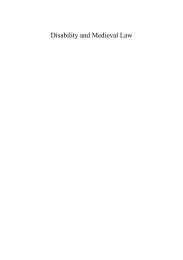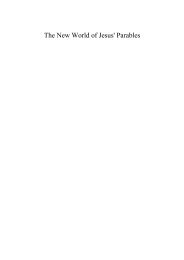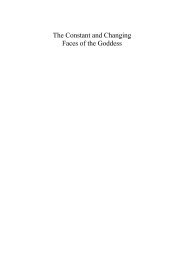Sample pdf - Cambridge Scholars Publishing
Sample pdf - Cambridge Scholars Publishing
Sample pdf - Cambridge Scholars Publishing
Create successful ePaper yourself
Turn your PDF publications into a flip-book with our unique Google optimized e-Paper software.
2<br />
Chapter One<br />
time four aspects of terminology work: the special subject field, the<br />
languages, the purpose and the degree of abstraction. His overall approach<br />
to the theory of terminology, Einführung in die Allgemeine<br />
Terminologielehre und terminologische Lexikographie ‘Introduction to the<br />
General Theory of Terminology and to terminological lexicography’, was<br />
published posthumously in 1979 (Cabré, 1999, p. 225).<br />
The traditional approach represented by Wüster and adopted by many<br />
later prominent terminologists was challenged by the corpus-based<br />
approach which evolved in the 1980s (Sager, 1990, p. 56). The traditional<br />
and corpus-based approaches constitute the mainstream approach to<br />
terminology, which is described in section 1.1.1. An alternative approach<br />
was developed by Rita Temmerman and is known as the sociocognitive<br />
theory of terminology. This approach is characterised in section 1.1.2.<br />
Apart from the traditional approach and the sociocognitive approach, there<br />
is a third approach to terminology, based on the FrameNet formalism. This<br />
approach evolved in parallel with the formation of the traditional approach<br />
and is presented in section 1.1.3.<br />
1.1.1 The mainstream approach<br />
The traditional approach to terminology is often referred to as the<br />
general theory of terminology (Pearson, 1998, p. 10). It is based on the<br />
theory developed by an Austrian engineer, Eugen Wüster. In his theory of<br />
terminology, Wüster (1979, p. 2) argued that the proper description of<br />
terms differs from the proper description of general language words. He<br />
suggested that work on terms differs from work on general language<br />
words in three respects. First, terminology work starts from the concept.<br />
Concepts exist independently of terms and any expression used to<br />
designate them should be considered in isolation from their labels or<br />
terms. Concepts are mental abstracts to which labels are assigned. The<br />
second distinction which Wüster makes refers to vocabulary. Wüster<br />
believes that terminologists are interested only in vocabulary and are not<br />
concerned with the theory of morphology or syntax. Traditional<br />
terminologists were not interested in examining terms in use as they only<br />
wanted to establish what they represented. The third distinction Wüster<br />
makes is about standardisation. Terminologists are concerned with<br />
imposing norms for the use of language. Their objective is to fix and<br />
standardise meaning in order to avoid confusion. This is achieved by<br />
creating a standardised collection of terms (Wüster, 1979, p. 2).<br />
Wüster’s approach to terminology is concept-oriented or onomasiological.<br />
It has been applied by many later terminologists. Wright (2001b, p. 579)
















